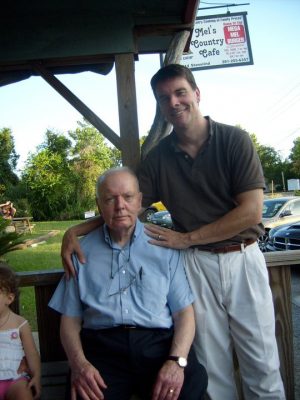This football season, the New York Times published an article praising the head coach of the Houston Cougars, Tom Herman, for his physical affection for his players, in particular for his kisses.
“How do you motivate a human being to do things against his own nature?” the article quotes him. “There’s two things: love and fear. And to me, love wins every time.”
First, the photo in the article, of the white Herman kissing a black player, brought to mind my own high school football experience. Most of my teammates were black and our coach was white. Coach Bob’s gruff demeanor was the antithesis of Herman. We loved him anyway.
With men, love does matter.
[Tweet "With me, love does matter."]
I went through “That Man is You” a few years ago, and one of the most stunning pieces of research compiled by founder Steve Bollman had to do with the influence of a father in children carrying on their faith. He talked about how whether a father demonstrated piety or not was perhaps the single most important factor, regardless of the faith of the mother.
At the time, I remember thinking about my own father, and how he played a more typical role, and left the job of inculcating religious faith in the nine of us (six boys) to my mother.
I wondered how most of my siblings and I were still practicing our faith, some quite deeply, including one priest, if what Steve said were true. Were we an anomaly?
From the Times article: “[Herman]’s disrupting a stereotype about boys and men, a notion of masculinity that says boys and men are only driven by the desire for competition and autonomy,” said Niobe Way, a psychology professor at New York University. “All the research — not just mine — emphasizes that humans are actually not driven by competition and autonomy. What we’re driven by is the desire to be in connected communities.”
My father never stopped kissing us, and never apologized or acted shy or uncomfortable about it. A busy corporate attorney, most evenings he returned home from work while we’d already begun dinner. Without fail, he’d circle the large dinner table in his three-piece suit, bestowing a loving smooch on each of us before sitting down. Love trumped hunger.
 Always connected. Photo courtesy of author. All rights reserved.
Always connected. Photo courtesy of author. All rights reserved.
In my adolescence, I took it as a point of pride that he and I still shared such a strong bond of physical affection. Not just the masculine face-scruffing bear hugs I cherished, but tender greetings and fond farewells that always included pecks on the cheek.
Could that physical bond have served to strengthen the emotional bond to my father I would need later in life, as I struggled in my early adult years to live virtuously and follow the faith my mother taught me?
It seems to me that my father’s physical expressions of affection were more than just a personality trait. The cultures in western Europe retain this affectionate characteristic. Ever seen The Godfather? Italians, French and Spanish kiss - a lot. But they aren’t passing down the faith very well.
So, maybe my dad just helped make me a good dad, and my faith survived in spite of his passive approach to religious inculcation. Whatever it is, I’m certain it had a lasting impact on me.
And at the end of his life, frail and hard of hearing, what a blessing to hold him softly by the hand and gently kiss his head, as if it were the most natural thing in the world. I’m sure he felt what I meant.
Copyright 2016 Kiernan O'Connor
About the Author

Guest
We welcome guest contributors who graciously volunteer their writing for our readers. Please support our guest writers by visiting their sites, purchasing their work, and leaving comments to thank them for sharing their gifts here on CatholicMom.com. To inquire about serving as a guest contributor, contact editor@CatholicMom.com.


.png?width=1806&height=731&name=CatholicMom_hcfm_logo1_pos_871c_2728c%20(002).png)
Comments